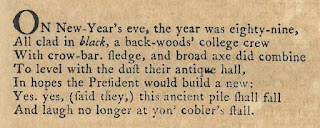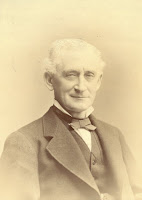 For one of the most iconic views of the College, Dartmouth Hall has quite a fraught history. Though many people know that the old College Hall, as the building used to be known, burned down twice, few are aware that its first restoration actually occurred in the late 18th century, after students tore the structure down late one night. Ephraim Smedley, class of 1793, wrote in his diary that “The demolition of the old Hall happened on Dec. ye 3 A.D. 1789 about 7 o'clock in the evening there were seventy five of students, in number who combined for that purpose.” Apparently, the buildings were in such terrible shape that they were almost a danger to the members of the College. Work to restore the old College Hall had been frustratingly slow, and the students took it upon themselves to incentivize more rapid progress.
For one of the most iconic views of the College, Dartmouth Hall has quite a fraught history. Though many people know that the old College Hall, as the building used to be known, burned down twice, few are aware that its first restoration actually occurred in the late 18th century, after students tore the structure down late one night. Ephraim Smedley, class of 1793, wrote in his diary that “The demolition of the old Hall happened on Dec. ye 3 A.D. 1789 about 7 o'clock in the evening there were seventy five of students, in number who combined for that purpose.” Apparently, the buildings were in such terrible shape that they were almost a danger to the members of the College. Work to restore the old College Hall had been frustratingly slow, and the students took it upon themselves to incentivize more rapid progress.Interestingly, most of the story can be pieced together by looking at small references to the event in a number of different sources; Smedley includes only the one sentence in his journal entry for that day, instead focusing on the readings he had completed and other details of his schoolwork. Another letter similarly includes only one brief inquiry into the events. A student’s historical exploration of the history of Dartmouth Hall briefly recounts the students’ motivations for their “nocturnal visitation,” concluding that “not even the College officers were sorry to see it go,” and that the students’ actions had the desired effect of speeding up the restoration process.
Our favorite retelling of the event is Philip Freneau’s poem “On the Demolition of Dartmouth College.” By no means the most reliable account (Freneau wasn’t even present that evening) it is certainly the most fun! Freneau adds some (possibly imagined) elements to the story, including the ringing of the College bells to call students to action, and an impassioned speech from the reluctantly awakened “reverend man that college gentry awes” that was largely ignored by students more focused on their mission. In a testament to its playful humor and clearly fantastically imagined nature, the poem concludes “So, three huzzas they gave, and fir’d a round,/Then homeward trudg’d—half drunk—but safe and sound.”
To trace the story of the Demolition of the College Hall yourself, come in and ask for MS 789558, MS 790159, D.C. Hist. LD1440 D3 L4, and Val 815 F88 L2.




